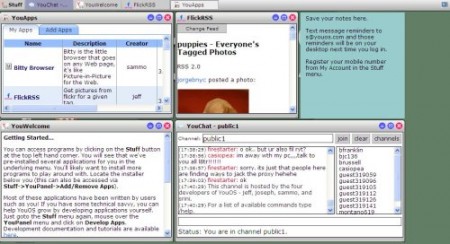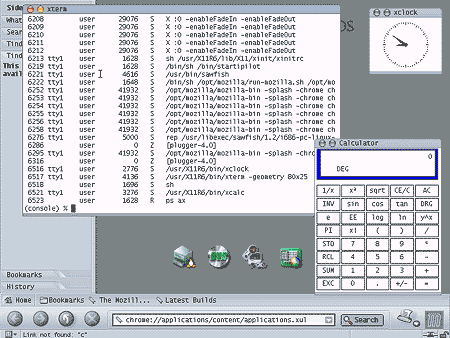GoogleOS what to expect?
There is no product like GoogleOS, but nevertheless it is one of the most discussed web products. People can't stop discussing it and even imagine screenshots of it! It seems everyone expects Google to compete directly with Microsoft in the release of operating systems. However, Google refuses this and sometimes even laughs at all this noise. Nevertheless, we decided to analyze what Google could lead with their strategy and from this determine what the probability of GoogleOS exit.
We see 3 scenarios of GoogleOS development:
We will try to consider each of them separately, and then at the end we will make our “prediction”. By the way, we think that maybe less than six months left until the release of the operating system.
If you ask, “What will GoogleOS look like?”, Then most people will say that it will be an AJAX-based copy of the Windows desktop. In other words, webOS (aka Webtop). We remind you what is WebOS, it is basically a virtual desktop on the network and it has a number of built-in applications. Google already has a release history of web-based products that simulate desktop applications: Gmail was the first desktop client, like a mail agent, and now they have Google Docs, Spreadsheets, Google Calendar and other desktop-like products. Also it should be noted GWT - Google widget set? which allows Google web applications to bypass desktop incompatibilities.
On the other hand, a group of startups such as YouOS, Goowy, DesktopTwo, Xin and eyeOS have already taken up this problem and have already advanced quite far. So if Google engineers are not yet working on this option, then it is better for them not to start. YouOS AJAX with the investment of Paul Graham gives the impression of the most obvious choice at this time.

YouOS Screenshot
Another option for Google is to create their own personal Linux distribution. A free Linux license allows everyone to create their own distribution. Linux is also the market leader in server operating systems, but as a desktop it is still far behind Windows and MacOS. Some believe the latest trends in the rise of Linux can make a difference.
This script is most traditional in terms of replacing Windows with another OS instead of creating a webtop. In fact, it has already been beat Ubuntu. There were rumors about his purchase by Google.
If this option is implemented, Google can open their operating system as freely downloadable and advertise it on their home page. they can also make the network file system a basic substitute for the existing UNIX file hierarchy — another reason why Linux is lagging behind the leaders of the desktop OS market.
This option is also possible. for example, an OS that simply loads from a computer connected to the Internet and then opens Firefox. Then it's up to the rest of the diligence and Google sites. This is a more logical strategy. Because then Google can create a page that connects all their services to the application. And people will have the freedom to choose: use the service or application.
Similar concepts already exist. For example, Puppy and Damn Small - Linux distributive "size" in two credit cards. The advantage is that you can carry them with you on any media without installation on the HDD.
ByzantineOS, a dead project, did just that. Its sole purpose was to load and launch a window manager on the basis of Mozilla, but then you could not close the browser window

Screenshot ByzantineOS
Be that as it may, Google can take a more radical step: replacing the standard BIOS with its own BIOS.
We believe that everything will become clearer in the next 6 months. Mirosoft will crush on Google its Vista OS, which has become more popular than any of the versions of Windows during the release.
In this case, Google’s user statistics may be understated, so we think that Google will take a sharper step: promoting Firefox and some other companies for GoogleOS. Yahoo! has already responded to Microsoft's threats about the excesses associated with the individual settings of IE7 for their users. But we believe that Google will be more aggressive and competitive and will promote its own OS. GoogleOS can become a reality within 6 months!
Opportunities
We see 3 scenarios of GoogleOS development:
- Webdesktop (Webtop)
- Its full Linux distribution
- Lightweight Linux and / or BIOS
We will try to consider each of them separately, and then at the end we will make our “prediction”. By the way, we think that maybe less than six months left until the release of the operating system.
Webtop
If you ask, “What will GoogleOS look like?”, Then most people will say that it will be an AJAX-based copy of the Windows desktop. In other words, webOS (aka Webtop). We remind you what is WebOS, it is basically a virtual desktop on the network and it has a number of built-in applications. Google already has a release history of web-based products that simulate desktop applications: Gmail was the first desktop client, like a mail agent, and now they have Google Docs, Spreadsheets, Google Calendar and other desktop-like products. Also it should be noted GWT - Google widget set? which allows Google web applications to bypass desktop incompatibilities.
On the other hand, a group of startups such as YouOS, Goowy, DesktopTwo, Xin and eyeOS have already taken up this problem and have already advanced quite far. So if Google engineers are not yet working on this option, then it is better for them not to start. YouOS AJAX with the investment of Paul Graham gives the impression of the most obvious choice at this time.

YouOS Screenshot
Full Linus Distributor
Another option for Google is to create their own personal Linux distribution. A free Linux license allows everyone to create their own distribution. Linux is also the market leader in server operating systems, but as a desktop it is still far behind Windows and MacOS. Some believe the latest trends in the rise of Linux can make a difference.
This script is most traditional in terms of replacing Windows with another OS instead of creating a webtop. In fact, it has already been beat Ubuntu. There were rumors about his purchase by Google.
If this option is implemented, Google can open their operating system as freely downloadable and advertise it on their home page. they can also make the network file system a basic substitute for the existing UNIX file hierarchy — another reason why Linux is lagging behind the leaders of the desktop OS market.
Lightweight Linux and / or BIOS
This option is also possible. for example, an OS that simply loads from a computer connected to the Internet and then opens Firefox. Then it's up to the rest of the diligence and Google sites. This is a more logical strategy. Because then Google can create a page that connects all their services to the application. And people will have the freedom to choose: use the service or application.
Similar concepts already exist. For example, Puppy and Damn Small - Linux distributive "size" in two credit cards. The advantage is that you can carry them with you on any media without installation on the HDD.
ByzantineOS, a dead project, did just that. Its sole purpose was to load and launch a window manager on the basis of Mozilla, but then you could not close the browser window

Screenshot ByzantineOS
Be that as it may, Google can take a more radical step: replacing the standard BIOS with its own BIOS.
We believe that everything will become clearer in the next 6 months. Mirosoft will crush on Google its Vista OS, which has become more popular than any of the versions of Windows during the release.
In this case, Google’s user statistics may be understated, so we think that Google will take a sharper step: promoting Firefox and some other companies for GoogleOS. Yahoo! has already responded to Microsoft's threats about the excesses associated with the individual settings of IE7 for their users. But we believe that Google will be more aggressive and competitive and will promote its own OS. GoogleOS can become a reality within 6 months!
')
Source: https://habr.com/ru/post/31144/
All Articles